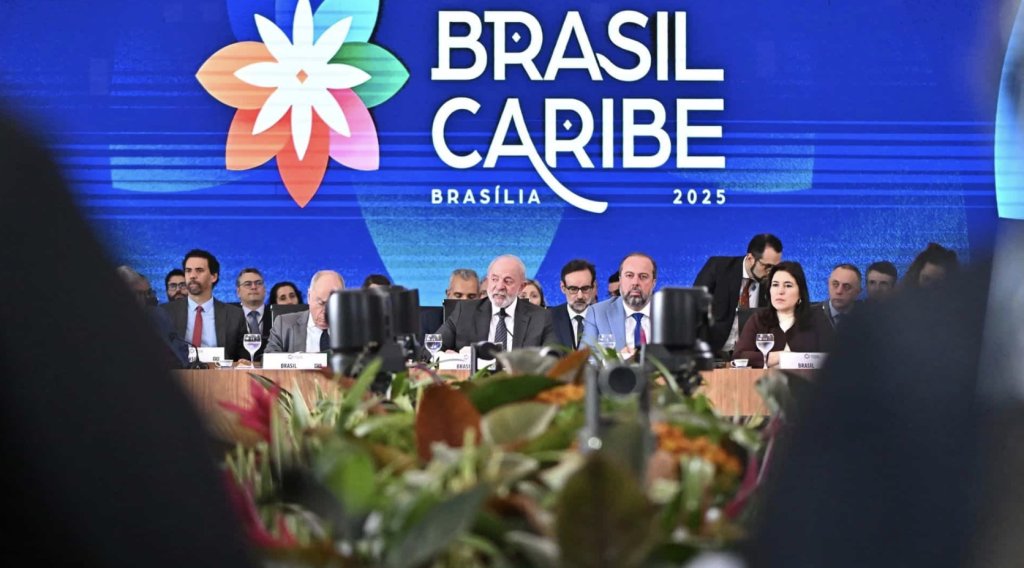
The Brazil-Caribbean Summit that took place 13 and 14 June 2025 in Brasilia concluded with a significant pledge of US$290 million for Haiti and renewed promises of international support for the beleaguered Caribbean nation. Haiti’s deepening economic, political, social, and humanitarian crisis was a central focus of the discussions.
During the event, several heads of government for the Caribbean accepted the invitation to meet made by Brazilian President Luiz Inácio Lula da Silva and called for more support for the UN-backed security mission in Haiti.
The summit saw attendance from a host of regional leaders, including Dominican Republic President Luis Abinader and Guyanese President Irfaan Ali. Also present were the Prime Ministers of Antigua and Barbuda, The Bahamas, Barbados, Saint Lucia, and Saint Kitts and Nevis, along with Cuba’s Vice President Salvador Valdés Mesa.
Fritz Alphonse Jean, President of Haiti’s Transitional Presidential Council (CPT), also participated. Other Caribbean nations, including Belize, Dominica, Grenada, Jamaica, Saint Vincent and the Grenadines, Suriname, and Trinidad and Tobago, were represented at the ministerial level.
During the event, the president of the Inter-American Development Bank (IDB), Ilan Goldfajn announced a US$290 million donation is earmarked for Haiti. Speaking to the assembled leaders, Goldfajn stated the funds would finance school feeding programs, the recovery of hospitals and other basic infrastructure, and private sector initiatives aimed at creating jobs and income.
However, Goldfajn could not elaborate to journalists on how the donation would be channeled, suggesting it might be distributed through non-governmental organizations or a “still functioning” ministry within a country where institutions have largely collapsed. He did specify that the funds could not be used for public security matters, a key driver of the crisis in the Caribbean nation.
While the IDB’s announced donation may seem modest against the backdrop of Haiti’s multifaceted crisis, the summit demonstrated abundant political solidarity and good intentions.
Both President Luiz Inácio Lula da Silva of Brazil and Barbados Prime Minister Mia Mottley, who holds the rotating presidency of the Caribbean Community (Caricom), underscored this support at the summit’s close.
“Caribbean countries have always played a central role in efforts to stabilize Haiti,” President Lula stated in his remarks. He emphasized that “a more robust presence from the entire international community is now needed.” He called for greater United Nations involvement in the issue.
President Lula emphasized food security, offering Brazil’s expertise as the world’s largest food producer and exporter. He pointed out that “more than twelve million Caribbean people are in a situation of hunger,” yet “enormous opportunities for cooperation” with Brazilian state and private entities remain underexplored.
The Brazilian President asserted that “hunger is only overcome with a combination of good public policies and adequate financing.” He urged Caribbean nations to join the Alliance Against Hunger and Poverty, which he launched last year within the framework of the G20.
Mottley of Barbados echoed the position of Brazil regarding more backing for Haiti. She lamented that because Haiti “is not a traditional conflict theater, it is ignored” by much of the international community.
The Barbadian Prime Minister highlighted the dire situation, noting that amidst the resurgence of violence, half of Haiti’s approximately eleven million people face hunger, and ten percent of the population has been displaced by armed gangs.
Speaking during the event, the Prime Minister of Bahamas Philip Davis highlighted the importance of the attendance of the Dominican Republic and Cuba to the Caricom meeting.
He stated: “We must continue to champion Latin America and the Caribbean as a zone of peace. “I am pleased to recognize the participation and support from Cuba and the Dominican Republic in this forum. The Bahamas is here to be a partner of CARICOM and the greater Caribbean, as is Brazil. We cannot exclude anyone from this partnership. This is an inclusive region and we are here to support an inclusive dialogue between and amongst us. “
President Luis Abinader called for the Brazil-Caribbean Summit to be a regular platform for regional discourse. He spoke of the impact of the Haiti crisis, backed the position of the Presidential Transition in Haiti to not negotiate with the criminal gangs and called for more UN funding. He spoke of regional environmental issues including the threats of sargassum and the positive increase in renewal energy alternatives. He also called for more intra-regional trade.
Beyond Haiti, the summit also explored avenues for enhanced cooperation between Brazil and the Caribbean across areas such as climate change, energy transition, disaster management, air and maritime connectivity, and food security.
Read more:
Diario Libre
Reuters
Government of Brazil
President Luis Abinader remarks in Brazil-Caribbean Summit
Presidency
16 June 2025

